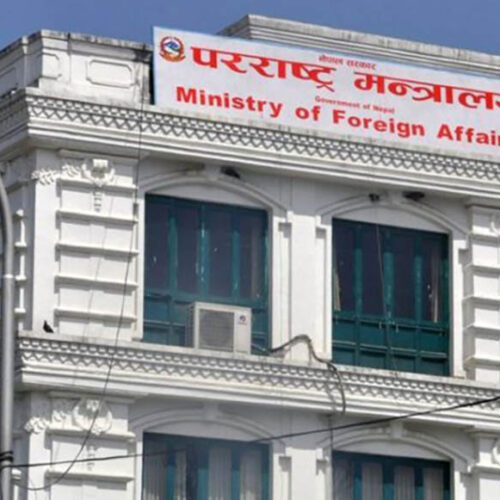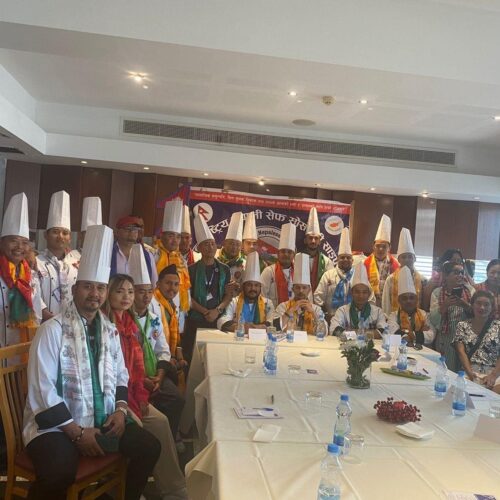COVID-19 has spread across the globe and has become a threat to our health, lifestyle and future.
To counteract its spread, governments around the world have been forced to impose strict restrictive measures that have led to the complete collapse of the world economy.
Thus, inevitably, the health crisis will also lead to an economic crisis, the magnitude of which will largely depend on whether we can reduce the spread of the virus within a reasonable time, but also on the form and scope of the economic reaction from the authorities. Its economic effects might be bigger than that of the financial crisis of 2008-09.
Nepal cannot be an exception to the massive negative shock facing the global economy.
We are a small economy without having a limited number of industries largely contributing to its GDP.
Most of the industries such as travel and tourism, airlines, hotels and restaurants have been greatly affected whereby none of the industries alone contribute 5% each to the GDP. Several firms at corporate and individual levels will have hard times to meet up loan services along with payrolls, rates, and rents.
Thus, they might face insolvency of ventures having domino effects on the economy. More importantly, large defaults of loans towards banking and financial institutions may create systemic risk in the markets too.
IMF predicts that Nepal will have 1.9 % GDP growth FY 2020/2012 which is the second highest in South Asia (Bhutan being the first one).
The economic cost of a one-month lockdown is a 3 per cent contraction of full-year GDP,” said Shaun Roache, chief Asia-Pacific economist at S&P Global Ratings. Likewise, the Ministry of Finance of Nepal has projected a loss of US$2 billion to Nepalese economy out of this novel pandemic.
In sum up, these industries as a whole will have huge economic costs to Nepal’s GDP. In light of the above, we recommend following list of action plans in terms of both short term and long term:
- Switching of laid off employees towards the agriculture industry by providing appropriate technical training to the displaced workforce both from domestic and migrantworkers to them and further provide loan subsidy to the agriculturist. Step change in agriculture industry using a modern technology e.g. hydro-aquaponic, vertical farming, organic farming, roof-top farming, supply chain, packaging and freezing technology and marketing should be adopted. Other value products like medicinal plants are also expanded. Community organic composting should encourage by providing technology and financials subsidy by GoN from environment fund (we need to bring expertise from Isreal, Netherlands and New Zealand. Moreover, firms like Biotech, science and technology based soft industries, high-values and low volume products for niche market and manufacturing industries need to be originally developed in Nepal. These industries can reboot the economy, save thousands of jobs and sustain hundreds of thousands of livelihoods. Infrastructure development, an integrated renewable energy industry and high-value low volume natural resources Li, rare earth.
- Migration and /or Remigration of companies – the returnees Diaspora wants to have their overseas companies be transferred to Nepal and to take the status of Nepalese resident companies due to various reasons. As of now, there is no Law as such in Nepal. This is, however, allowed in many countries of the world. Also, in its reciprocity, Nepal should allow re-domiciliation of Nepalese companies overseas however, here we need to have our prudent measures such as capital control, TIE, DTTA, BIPPA, etc in place. Again, what we see here is that ACT 2021 is an economic development economic factor.
- Create a conducive investment environment to Returning Nepalese – Nepalese can retain their foreign currency accounts with banks aboard and/or hold, transfer or dispose their foreign currency assets such as shares, securities or investments in business and properties. Moreover, they are even allowed to go abroad again and use the funds out of foreign currency accounts for investments, travel or employment. This will bring ventures, funds, enterprenrial ability and much more. It is a global practice that provides a win-win situation once the country encourages both inbound and outbound investments.
- Loan refinancing or subsidy to companies whose cash flows have been affected by the crisis, however, having in mind not to create a banking crisis
- Loans and guarantees to affected industries having quasi instrument nature such as common or preferred stocks or options which would eventually be sold to private investors
- Communication of NRN foreign currency Fixed Deposits scheme to at least Nepalese Diaspora by the Government of Nepal so as to bring liquidity into the markets
- Partial or full tax waiver for withholding tax on dividend repatriations so that Foreign Investors will retain their profits and reinvest them back into the Nepalese economy. IMF states that investors have already removed more than US$83 billion out of emerging countries.
- Unlike in 2008-09 financial crisis, where the remittance was relatively affected due to the fact that the GDP of Diaspora resident countries such as Gulf and middle east countries were hardly affected. However, on the contrary, the current virus is a shared global challenge affecting almost all countries and most importantly, gulf economies have been rocked by both this virus and oil price plunge and therefore, we can envisage that the remittance will be affected. Thus, in order to avoid liquidity conundrum into the market; The Government of Nepal should allow NRNs to bring around USD5, 000 via a banking channel with a guaranteed repatriation of one year maturity without any withholding taxes whatsoever given the fact that Nepal has limited Double Tax Treaties. This way; NRNs will be taxed at one place ONLY.
- Considering returning of Nepalese Diaspora living abroad especially retirees or business professionals, we can think of devising domiciled and non-domiciled tax facilities like UK, Greece, did in order to attract Diaspora and investors funds. This will help us to bring liquidity into Nepalese markets.
- Skill training to migrant workers especially in industrial countries such as Japan, South Korea as per World Bank report on migration and remittance 2019. These high-paying jobs will generate high remittances to GoN.
- To postpone dividend payments or share buybacks or capital reductions of BFIs and Insurance companies. Alternatively, to prose only scrip dividend or bonus share and this will maintain liquidity into the markets. India, UK, EU and the USA are proposing the same.
- Defer Direct and Indirect taxes to the extent possible without causing a lot loss to the Government Revenue.
- Release of Government spending funds in a timely manner to support and maintain liquidity.
- Regulations on insurance companies so as to cover up material adverse events caused by COVID-19
- Allow Foreign Direct Investments (FDIs) into fintech ventures especially in Data Centre, Big Data, Payment Systems such as Google Pay, Apple Pay, World Pay etc. where existing firms in Nepal lacking both capital and technical know-how. Investors of these industries can take Nepalese firms into international level such as Alibaba, Tencent, Softbank have invested into Bangladesh and India and thereafter, in turn have taken these firms into world level.
Also, allow tax reductions to investors who invest in either of these fintechs so that funding issue will be resolved. Many countries such as Israel, Cyprus, and Luxembourg have facilitated so. These industries can help us to leapfrog economic activities and thus the growth.
16. Infrastructure projects – awards of road projects, existing hydropower projects we should award them if falling in pipeline falling under Nepal Investment Board. These industries can provide a lot of job offerings.
17. Securities Exchange Board of Nepal (SEBON) – FITTA 2019 has opened doors for alternative investments Hedge Fund, Private Equity Fund and venture Capital however legislation on such has not been out and thus lack of such investors. These investors especially Venture Capital are quite imperative for young entrepreneurs who are restricted to conventional bank financing that needs real estate collaterals in one hand. On the other hand, the ACT 2021 has closed-door for them accessing foreign equity or financial partner.
18. We should also swift amend Investments overseas restrictions ACT BS 2021 (1964 AD) as this ACT will inhibit the growth of fintech into world level and moreover, this ACT does not let Nepalese entrepreneurship to flourish and work with Multinational Corporations (MNCs).
Example, I can give you in case of NRNA Foundation; a registered NNRA foundation cannot open its bank account overseas with this ACT unless NRNB Exchange Department gives us a green signal in advance. This is causing a lot of loss to the country. A similar example can be taken where Nepalese entrepreneurs are not allowed for foreign investments. This can be dealt with without infringing the practice of Nepalese capital controls.
19. Merger and acquisition Laws – Like the GoN facilitated M&A laws for Banking and Financial Institution (BFIs), M&A laws should be extended further to telecom, trading, investments. This will result in the growth of capital markets and thus, the country will become more attractive for investment purposes.
20. To relax some lockdown restrictions such as agricultural and manufacturing industries, management and consultancy firms such law firms, accounting firms whereby social distance can be managed with ease.
21. Foreign Investment, Technology and Transfer Agreement (FITTA 2019) – for NRN and Foreign Investors, the newly enacted FITTA 2019 has opened a lot of areas and offered benefits the investors however, it still needs some amendments in few areas such as threshold of circa US$450,000 as for FDI must be changed without any further delay and should be rather made US$200,000 like Sri Lanka, Japan, and South Korea. There are also some areas which need amendments into Foreign Investment Technology Transfers Act (FITTA, 2019), lists are attached for ease of reference.










